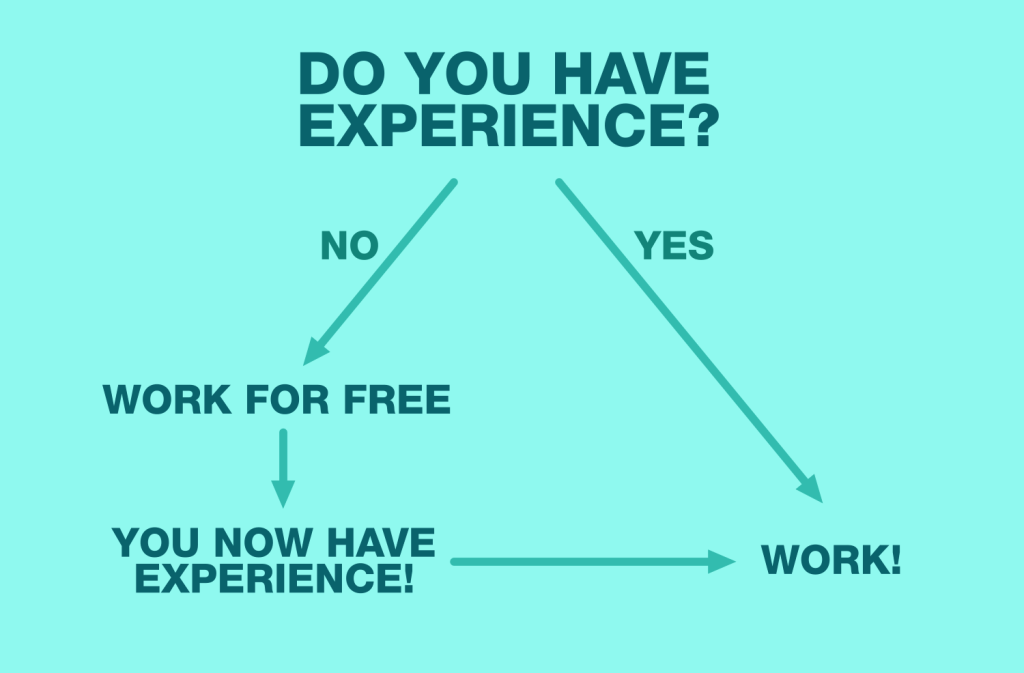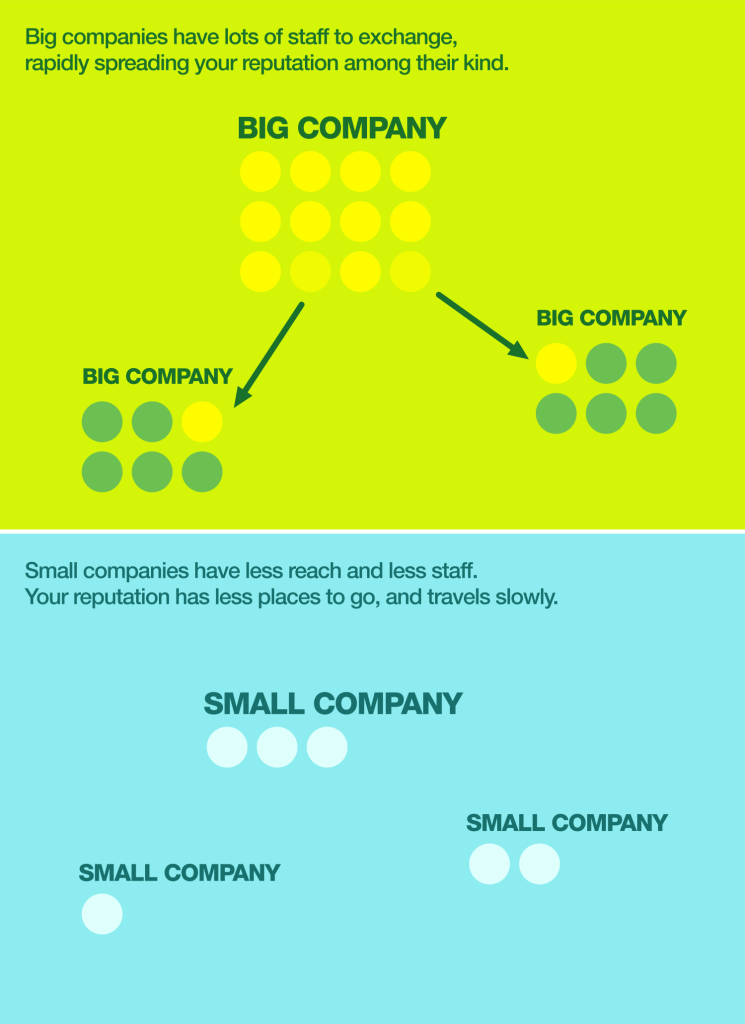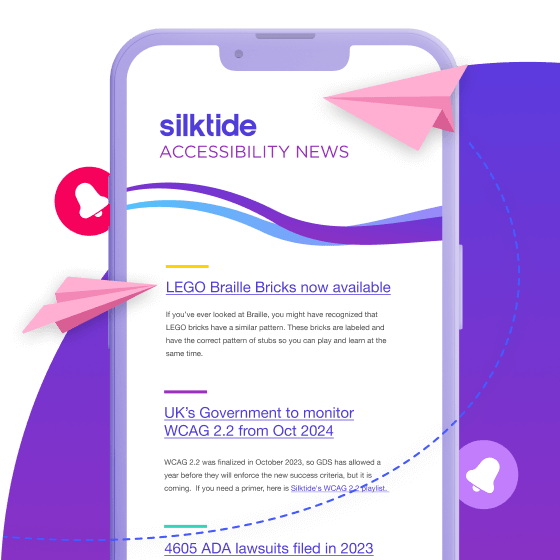When I first started a business, I was 21, bald, and had the social confidence of an asthmatic field mouse.
Fortunately I started my business with an ultra-confident Sales Director, who unfortunately turned out to be both hopeless and completely mental. He punched me in the face during our second board meeting.
At one of our first pitches to a prospective client he bragged how he “wasn’t much of a techie” and “didn’t know how to use email”. These were not inspiring words from a cutting edge web design company.
So in order to feed myself, I rapidly learnt how to sell. In our first year I secured government contracts and FORTUNE 500 clients, all with no money and an office the size of a refrigerator. Let me tell you how.
Credibility comes ahead of time
A new business has no reputation. So at the start, all credibility is on you, the founder.
For my part, I built websites as a student. One in particular – a social network for my university – had grown to thousands of active users, and was raising a lot of controversy on campus.
I made stuff like this simply because I wanted to, and the passion showed. When you can’t find paid work, create stuff for free. Free work is your way of bootstrapping credibility, and you don’t need anyone’s permission to earn it.

Enthusiasm + knowledge
I was not a conventional salesman, with slicked back hair and fancy suits. I was however, fiercely enthusiastic and highly knowledgeable. And it turns out that matters more.
People buy from people. You may resent this, but they’re far less moved by your brochure or your features. They evaluate you as a person, and that person had better be convincing. If you are sincerely bubbling over with excitement at all the wonderful things you could do for them, your enthusiasm will win many people over. Your credibility (above) should do the rest.
Confidence will come with time. But the best way to build confidence is to become good at something and get yourself in front of people who will appreciate it.
Get in front of everyone you know
My first sale – a £3,000 ($5,000) website – was to the residence where I had lived as a student.
These were people I knew. I blagged myself a meeting and sold them on what I could do. I already knew them and what they wanted; they were sold on the basis of my free social network and the fact that they knew me.
This is the key. People buy from who they know. You probably don’t want to hear that, but that doesn’t mean it’s not true. Just being vaguely known by that guy who knows that guy is enough to get you in the door of most places.
I sold to the school where I’d studied at university. I pitched to the companies where my friends were working. Every single person I knew, however low-level they might seem, was a potential inroad to another opportunity. This alone got me a sale to a FORTUNE 500 company (3M) in our first year.
Later I would learn about ‘networking events’, but I didn’t use any for the first 6 years of my business. The best lead is always from someone you already know, and the biggest mistake people make is assuming that they don’t know anyone.
Get in at the ground floor on big names
My first tiny sale to a department of a university suddenly gave me the ability to say “I did a website for this university”. Nevermind that it was a small project; it could have been free. The most powerful indicator of credibility is not your work, it’s the names you can associate with.
One great side effect of big names is they tend to have lots of staff, who move on to other organizations and recommend you. Someone from that university started working for a local council, and soon I had my first government client. Someone there moved on and I had another. Big names attract big names.

Another great thing about big names – you can grow within them. Over the next 5 years that small school website let us pitch for their parent department, and ultimately the whole university – over 20,000 webpages and a lot more money. We never lost that contract in 10 years.
Crucially: deliver on service. If you don’t make your clients happy, none of this will happen.
Write and sound the part
You want to look presentable, of course, but don’t invest your hopes into this. Your appearance won’t win many sales, but a bad appearance will certainly cost you some. Don’t be the smartarse kid who doesn’t realize he needs a haircut, shower or deodorant.
Master speaking and writing clearly. The quality of your communication is one of the strongest indicators people will use when judging you; it can make a smart kid sound stupid, or an idiot sound vaguely intelligent. If you don’t know how to use apostrophes or capital letters, you’d best believe people who do will not judge you kindly. And they will never tell you.
Don’t mistake professional communication for fancy words and long sentences. If you can say a lot with a little, you’ve a much better chance of being heard and respected.
Things that work (but not for you)
If your sales strategy involves SEO or ‘Social marketing’, get a new strategy. Ask people who use those things – they work in the long term, and mostly as embellishment for established businesses. You are not Coca-Cola. Plan accordingly.
Advertising is almost always a fiery pit where your money goes to die. Look for what other companies like yourself (early stage, same industry) are doing with their advertising, and whether they appear to be successful. If you do advertise, spend lightly.
Don’t waste money on premature status symbols. Dropping cash on a fancy watch / car / office has terrible ROI – it might make you feel good, but it barely touches your odds of selling. I didn’t even have a car for my first 5 years of business and I was able to win contracts worth £100k ($160k) / year.
Summary
- If you have no reputation, work for free.
- People buy from people, so be enthusiastic and knowledgeable.
- Reach out to everyone you know.
- One tiny sale to a big name is a tentpole you can build your reputation on.
- Big organizations spread word of mouth far faster.
- Look the part, but more importantly: write and sound the part.
- Don’t expect results from SEO, advertising or status symbols.
By the way, I bought my face-punching Sales Director out after a year. Lovely fellow – but let’s just say he sold his 49% share of the company for less than it’s worth 12 years later. Ho hum.

